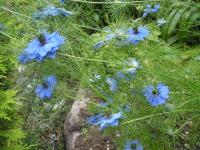June: It's Time for 'Love-in-a-mist'

A plant profile of Nigella damascena 'Miss Jekyll' and don't blame it on the cuckoo!; information about 'Cuckoo Spit', plus the benefits of broad beans as a learning resource; the joys of teaching children about gardening.
I have to start with a confession! I am guilty of pigeon-holing a lot of annual plants into the tender, high maintenance category. I should not do this, because there are many annual plants that are easy to look after and they are as tough as some of our most robust trees and shrubs.
One such example that is flowering right now is Nigella damescena 'Miss Jekyll'; common name Love-in-a-mist (pictured). During the hot summer months Love-in-a-mist is one of those plants that can offer a soothing, refreshing sea blue to any border; the flowers are bright blue. The common name probably refers to the way the flowers nestle amongst the very finely cut, wispy, feathery foliage.
The species from which Miss Jekyll was cultivated can be found growing wild throughout southern Europe and northern Africa. As with any plant, you can obtain a lot of clues about the cultivation required by looking at the conditions that their very close relatives have to contend with in the wild. Nigella damescena grows on rocky hillsides and wasteland in it's natural habitat, the soil is usually dry and of poor quality.
Therefore, Nigella damescena 'Miss Jekyll' should be grown in poor to moderately nutritious soil, it will flower best in full sun and is drought tolerant.
When the flowering period is over, swollen, inflated seed pods are produced which eventually spilt open, scattering hundreds of seeds in the vicinity. So, once you have sown the first packet of seed Nigella damescena 'Miss Jekyll' does the rest for you. You can enjoy summer after summer of Love-in-a-mist.
Cuckoo Spit
I'm sure that some of you will be wondering why every summer someone keeps spitting on your Lavender plants! For some strange reason, the blame seems to have been laid firmly at the door of the cuckoo; most people describe this condition that affects Lavandulas and other flowering plants as Cuckoo Spit.
If you gently rub some of the 'spit' between your fingers you will discover an interesting little insect called a Froghopper. It is the young Froghopper that sucks sap from the host plant and produces the frothy 'spit'. Severe infestations can distort plant growth and are best treated with insecticide, but although unsightly, the odd 'spit' here or there won't do too much harm and can just be washed off.
So, next time you want to know who has been spitting on your Lavender plants don't blame it on the cuckoo!
Gardening with Children
I've talked before about getting children involved with plants and gardening. My 2 year old son and I have been harvesting broad beans over the past couple of weeks. Back in the autumn, my son helped me to sow the broad bean seeds in the vegetable garden. He helped me to water the young plants, he helped to pick the ripe pods, shelling the beans is great fun! Half-an-hour later he sits in his high-chair tucking into his hard work.
I am convinced that being involved in this whole process from start to finish has something to do with the fact that he always eats all of the broad beans on his plate.
Guiding a young child through such a simple gardening process and to see the empty plate at the end of it is one of the most rewarding, magical events a parent can experience. It's a great start to a child's horticultural training as well!
Other jobs to be doing during the first two weeks of June:
- Priority watering: when water supplies are limited, concentrate on the plants that are particularly precious to you. For example, valuable young trees always get watered first in the PlantAdvice garden.
- Raise the cut on the lawnmower; during dry, warm weather this will reduce stress on the grass roots.
- Continue to rub-off greenfly from the shoot tips of affected plants
- Look out for sawfly caterpillars on Gooseberry plants, they can strip a plant of it's foliage at this time of year. Pick the caterpillars off and destroy.
Filed under General.

